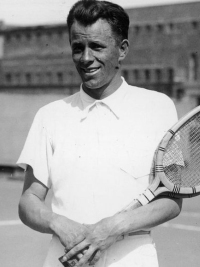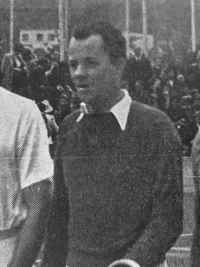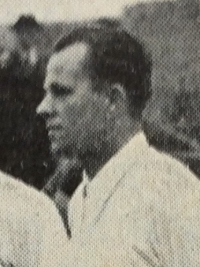Jozef Hebda
| Born |
Subscribe now
This information and data is not available because you are not our subscriber yet.
Please click here and get full access to the entire database! |
|---|---|
| Died | |
| Plays | |
| Bio | He was a Polish tennis player, multiple Polish champion and representative in the Davis Cup. Hebda became interested in tennis relatively late, after 20 years of age, before trying himself among others as a footballer. During his career he defended the colors of the Lviv Tennis Club, ŁKS Łódź, Legia Warszawa, Wisła and Olsza Kraków. He broke to the national tennis lead in 1930, when he was on the 5-8th position in the ranking of the Polish Tennis Association. A year later he was on 3rd place. In 1932, he won the first Polish championship in singles. He defeated Ignacy Tłoczyński in the final, depriving him of the chance to win the Miller Cup, a trophy awarded a champion who won three times in a row or became five times Polish champions. Hebda also beat Tłoczyński in the final of the international Polish championships, becoming the first Polish winner of this tournament. He also triumphed in the international Polish championships in 1937 and 1938, and taking into account in doubles and in mixed doubles, he won a total of eight titles (the last in 1947). In the Polish national championships in all competitions he won thirteen titles, the last in 1954. He also won the singles in 1933 (in the finals versus Ernest Wittmann), in 1935 (versus Kazimierz Tarłowski), in 1936 (against Tarłowski) and in the first post-war edition in 1945 (versus Władysław Skonecki). He did not use his chances for the fifth triumph - and thus winning the Miller Cup - in 1937 and 1938, succumbing to Tarłowski in the first final, and to Tłoczyński in the second. The national rivalry with Ignacy Tłoczyński (who finally became the Polish champion for the fifth time in 1939) enjoyed great interest from fans. In foreign competition, Hebda was relatively less successful than Tłoczyński, but he had, among others victory over the well-known Australian Viv McGrath in the French championship in 1933, and in friendly (inter-club) matches he beat the German Henner Henkel and Frenchman Jean Borotra. The Lviv player debuted in the national team in the Davis Cup in May 1931, contributing to the victory over Norway. In 1935 he defeated South African representative Vernon Kirby, a semi-finalist of the US championship a year earlier. He also presented good disposition in 1936, when in the match against Austria he scored two single points, beating Georg von Metaxa and Adam Bawarowski. However, this was not enough for Poland's victory. Interestingly, after the 'Anschluss' of Austria, these three players met together on the court in the doubles match of the Davis Cup in 1939, but in a completely different configuration - Hebda with Bawarowski in the Polish team, von Metaxa in hand with Henkel in the German national team. Hedba made his last appearance in the Davis Cup band after the war, losing in 1947 among others with the Englishman Tony Mottram. In total, he won 14 matches, lost 18. He defended national colors in the Central European Cup, which the Polish team won in 1938 after a two-year battle with the teams of Italy, Hungary, Austria, Yugoslavia and Czechoslovakia. During World War II, he was initially in Lviv. In 1940 he won the title of USSR champion in singles, without losing a set in the tournament. After the Germans seized Lviv, he managed to get to Kraków, where he remained until the end of the occupation, as well as in the post-war period. After the war, he continued his sports career because of his age with less success. He also worked as a youth tennis coach. Right-handed Hebda was known as a talented tennis player, with great skills, but also extremely chimerical. In the Davis Cup match with the Italian Emanuele Sertorio in 1936 he was able to win eighteen games in a row - from 1: 5 to 7: 5, 6: 0, 6: 0! On the other hand, he was also known for his entertainment lifestyle. Thus, he contrasted his rival Tłoczyński, whose tennis was considered to be worked out, and the player himself had the opinion of an extremely hard-working player. In 1932, Hebda was one of the leaders in the Top Ten Poll of "Przegląd Sportowy" for the best Polish athletes (8th place). |
| Tournament | AO | RG | W | US | Win-Loss |
|---|---|---|---|---|---|
|
Subscribe now
This information and data is not available because you are not our subscriber yet.
Please click here and get full access to the entire database! |
|||||


